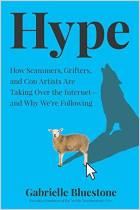Melden Sie sich bei getAbstract an, um die Zusammenfassung zu erhalten.

Melden Sie sich bei getAbstract an, um die Zusammenfassung zu erhalten.
Simon Clark and Will Louch
The Key Man
The True Story of How the Global Elite Was Duped by a Capitalist Fairy Tale
Harper, 2021
Was ist drin?
Here’s the story of a little-known fraud, involving hundreds of millions of dollars and famous investors.
Recommendation
The story of Bernie Madoff proved that it’s possible to fool investors for a surprisingly long time – at least as long as you have the control, charm and nerve for it. Journalists Simon Clark and Will Louch offer a cautionary tale in the same vein with this intriguing account of how an alleged fraudster used the momentum from a bit of modest investing success to construct a lofty edifice of hubris and spin. While the details of this scam centered on the modern idea of impact investing, its simple essence was as old as time: the classic Ponzi scheme.
Summary
About the Authors
Simon Clark, a journalist in London formerly with The Wall Street Journal, was nominated for the Pulitzer Prize in 2016. Will Louch, formerly with The Wall Street Journal, is with Bloomberg News in London.



























Comment on this summary